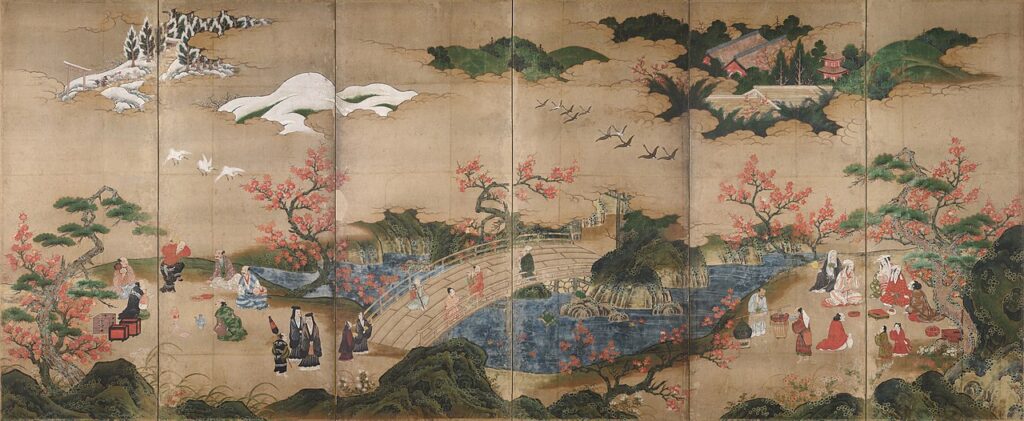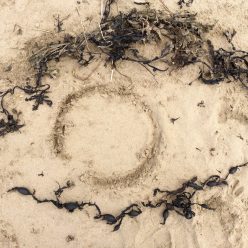
As this page deals with the very last section of his chapter, Hironobu Ota starts with a summary of the preceding sections, covered in “Being-in-the-Twofold-World,” “Ueda in Dialogue with Heidegger,” and “Ueda in Dialogue with Nishida.” As Ueda’s thought has, by and large, come to us in bits and pieces, in texts where he explains, and criticises, the thoughts of other thinkers, especially Heidegger and Nishida, rather than in a magnum opus, as Nishitani had given us in Religion and Nothingness, such a summary is really helpful to get an overview of his thought, at least with regard to the “Twofold Being-in-the-World,” which is one of his most prominent themes.
“According to the theory of ‘twofold-being-in-the-world’, we exist within the world and, at the same time, are located within the ‘hollow expanse’. The ‘world’ is defined as the horizon of our experience that constitutes the totality of meaning whereas ‘hollow expanse’ is defined by its lying beyond the horizons. The twofold structure of being-in-the-world that consists of the world (horizon) and hollow expanse (beyond horizon) is called ‘invisible twofoldness’. When we remain unconscious and neglectful of the ‘invisible’ hollow expanse, the world becomes the self-enclosed ‘A world’, which Ueda explains by interpreting the concept of ‘enframing’ in Heidegger’s philosophy. In contrast, when we are ‘permeated’ by the hollow expanse, the world begins to appear to us as the ‘B world’; that is, the harmonious world between human beings and nature, which Ueda explains by using Heidegger’s concept of ‘fourfold’. The twofoldness between the ‘A world’ and ‘B world’ is called ‘visible twofoldness’. The self that is permeated by ‘hollow expanse’ is brought about by the self-awareness of kleshas through ‘limit situations’, especially in case of the awareness of our mortality. It is in such awareness that the self can experience ‘facts just as they are’, which tear through our kleshas and the framework of language. Ueda refers to this state of being with the concept of ‘primordial experience’ or ‘primordial nature’ which is an interpretation of Nishida’s ‘pure experience’. In terms of existence, the self becomes ‘hollow existence’ in the awareness of ‘primordial experience’. Here we can encounter things in a poetic dimension and take a calm attitude toward the technological world.”
Ota points out that this theory of “twofold being-in-the-world” can be described as a “kind of philosophy of life,” in Japanese “sei-no-tetsugaku.” It appears, however, that no Japanese would ever express his/her way of living as a tetsugaku, which is a recent word coined from wisdom (tetsu) and learning (gaku) to translate the Western term “philosophy.” So, in “What is Religion?” (1992), Ueda uses the word “inochi,” after inquiring “what it means ‘to live as a human’ in contrast to what it is ‘to truly live as human’.” First, “he distinguishes between three layers of human life. The first layer is ‘biological life’ (seimei) which is shared by all creatures. Biological life can be analyzed by natural sciences, such as biology or physiology. The second layer is ‘cultural life’ (sei), which is exclusive to human beings. The cultural layer, in turn, consists in two aspects: ‘livelihood (seikatsu) and ‘life cycle’ (jinsei). Since human beings are a kind of animal, our ‘livelihoods’ that consist in providing for the necessities of life (e.g. food, clothing, and shelter) account for a ‘quantitative expansion’ of the ‘biological life’.”
For Ueda, however, “self-fulfillment in our ‘life cycles’ cannot be achieved in any meaningful sense by mere material pursuits alone.” In fact, he says, “there is a ‘loftiness of poverty’.” So, “the third layer of life as inochi, which goes beyond both the biological and the cultural, is mediated through this awareness of ‘death’ and ‘poverty’, which entails giving up one’s egoism and being satisfied with one’s lot in life.” Ueda writes:
“It is through [the awareness of] ‘death’ as the negation of biological life and through [the awareness of] ‘poverty’ as the negation of material wealth (as a cultural aspect of life) that life as ‘inochi’ can be lived in the fundamental sense. ‘Poverty’, in this sense, does not refer to something that is socially conditioned and must therefore be overcome, but rather to the internally spontaneous poetry or ‘releasement toward the things’ [in Heidegger’s philosophy].”
Ota further notes that, in “On a clump of trees” (1957, revised in 2003), Ueda describes inochi “as the form of primordial life that penetrates all creatures and human beings … the attitude that finds the truth of life in the coexistence and sympathy with trees, birds, clouds and waters.” And this attitude is “brought about only through becoming aware of ‘death’ and ‘poverty’ as experienced by human beings within the awareness of inochi. This awareness is the necessary condition for conceiving nature as a primordial experience” (Ota). For Ueda, such a return to an awareness of our “primordial nature,” would allow us to overcome the “destructive propensities” that are currently destroying the natural environment.
Ota concludes: “Inochi as a concept of life in the above sense is structured after the ‘twofold-being-in-the-world’. That is to say, biological and cultural life are accessible to us in the horizons that constitute the world. In contrast, inochi can be accessed through the awareness of that which goes beyond the horizons, i.e. ‘hollow expanse’. Thus, it could be argued that Ueda’s brand of ‘philosophy of life’ as the awareness of inochi provides the concrete contents to the otherwise formal theory of experience. And further, that the answer to Ueda’s question regarding the true meaning of ‘living’ ties in the awareness of ‘hollow expanse’ that permeates our life cycles and livelihoods in the form of inochi. Ueda’s philosophy of ‘twofold being-in-the-world’ must be described as the philosophy of inochi.”
Source:
Hironobu Ota – “Twofold Being-in-the-World in Ueda’s Philosophy – On His Interpretation of Heidegger and Nishida”in Tetsugaku Companion to Ueda Shizuteru, Ed. Ralf Müller, Raquel Bouso and Adam Loughnane (2022)
